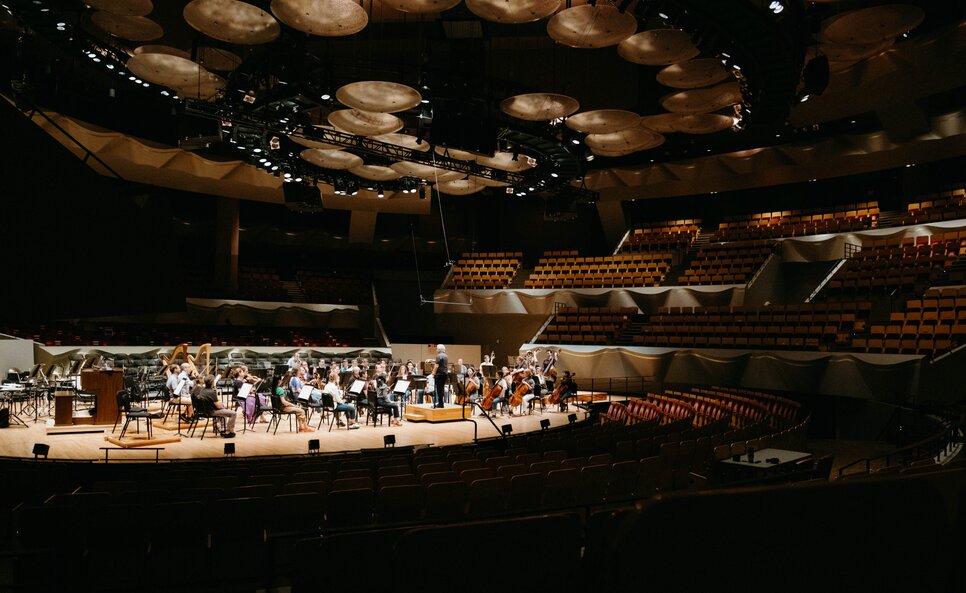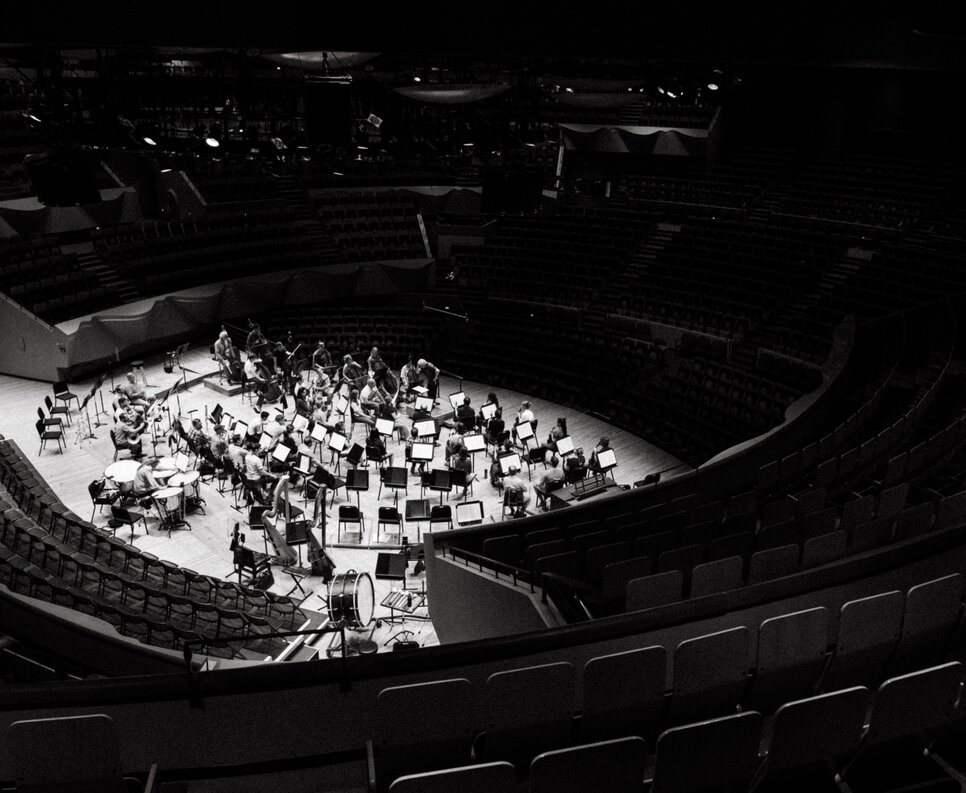Colorado Symphony Maestro Peter Oundjian saves his most exuberant expression for the orchestra
share

DENVER — Inside Boettcher Concert Hall, violinists move their bows back and forth, the sounds of brass echo throughout the hall, and people chat as the corps tunes in ahead of rehearsal. It is a symphony of eclectic sounds until Maestro Peter Oundjian walks across the stage and approaches the conductor's podium.
The musicians place their instruments down and look up at Oundjian, 68, who picks up his baton to begin rehearsing the company’s performance of Beethoven’s “Symphony No. 1,” one of the company’s final for the 2023-2024 season.
Oundjian became the symphony’s Principal Conductor in February of 2022. Before his tenure with the Colorado Symphony, he served as the Music Director for the Colorado Music Festival in Boulder.
Oundjian’s career spans five decades, and he began training as a violinist and singer at seven. Oundjian, who is Canadian and trained in the UK and US, learned to conduct while performing as a violinist with the Tokyo String Quartet. After suffering a hand injury in 1995, Oundjian shifted his focus from playing to conducting full time.
Oundjian, who studied at Julliard, then became the artistic director of the Caramoor International Music Festival in New York in 1997. Since then, he’s held numerous positions all over the world, most notably in a 14-year tenure as the music director of the Toronto Symphony Orchestra.
Rocky Mountain PBS spoke with Oundjian about the Colorado Symphony’s 2023-2024 season, what it takes to conduct an orchestra and how it’s different playing for Colorado audiences.
The following interview has been edited for length and clarity.
Rocky Mountain PBS: Can you tell me what you’re rehearsing this morning?
Peter Oundjian: Well, this morning we're rehearsing Beethoven's First Symphony, which is an absolute masterpiece. Iˇt’s a fairly early piece, but just beautifully crafted and it's a relatively small orchestra (50 players). It's almost like a slightly large chamber orchestra. It's nowhere near as big as the other piece we're going to be doing this weekend, which is the first symphony of Vaughan Williams, which is massive. It has a chorus, two soloists, huge numbers of players, percussion and all that kind of stuff.
But this morning is pure Beethoven.
RMPBS: Why are you performing this piece at this time of the year?
PO: I wanted to put together a program that made sense and was enticing. So I thought, why not start with the purest possible sort of symphony? A big-name composer like Beethoven, there is barely a bigger name than that. So it’s this wonderful contrast between what a symphony was around 1800 and what a symphony became by about 1910.
RMPBS: People see you [conducting] at the center of symphonies, but few people know what you do every day. Tell me what the work is like leading up to these performances and how you prepare for it.
PO: Well, my own preparation is very long. And I mean, in the case of both these symphonies, I've known them for decades. So you have to work extremely hard as a conductor. Some people wonder, what does the conductor do? But you really should know the score inside and out at every moment so that you can guide the [orchestra].
You shouldn't be looking at the score receiving news. You have to really absorb it. The work that we do together on the stage is all about bringing the character of the music in each particular moment to life in the most convincing way we can possibly do it.
There are many wonderful orchestras all over the world. They can play the notes and they can play the dynamics really well. What makes a difference for a listener is what is the dramatic sweep like? What is the narrative? What are we saying to them when we're playing?
And that's what we really work on.

RMPBS: How do you know what you want the piece to sound like? You can listen to it hundreds of times but you can’t speak to the composers who made these pieces.
PO: That's a very long process. So I can very well remember being 15 or so, playing the violin and playing a Brahms sonata, and thinking, “I know how this goes.” And I play it for a teacher or, you know, a much more experienced musician and they would say, “But what are you doing? I don't hear anything, you're not telling me anything.”
And I’d go, “No, but I'm playing it.”
And it took many, many years of experience, of doing it. I suppose it's a little bit like a director. They have to have a concept of a play they're directing. They have to know really what's behind every line and certainly every scene and how it all relates to the other scenes and the complete narrative.
So that's the exciting part in a way, putting that together so that we feel like we're ready to tell people a story and we're ready to evoke feelings in them, not just express our feelings, but to make them feel what this music allows us to experience. And that is unique to each conductor and each orchestra, of course, because everybody has their own particular concept.
RMPBS: What goes through your mind when you conduct? Many people have the experience of playing an instrument, they have the experience of being in a band, being in an orchestra. But few people get to be in your shoes.
PO: It's the conductor's job to inspire and give energy so that we can all play with one interpretation. So everything that's going on in my mind, assuming I'm focused, is about what is my idea to create in this next moment or this next minute or this passage as it relates to the following passage.
When I was studying, I read quite a lot of Stanislavski, who was a great Russian director and taught drama and wrote a lot of wonderful books about building a character an actor prepares. And these things are very important for [conductors] as well because we know to put our mind in the right place so that we have at least the chance of creating exactly what we envisage in our mind for the next moments and also know where we're going in the big picture.
So it's quite complicated. But you know, you of course get used to these things like anybody else, whatever their métier is, they become very good at thinking quickly and making sense of it all. Whereas to us it might look like, how do you manage to achieve all of that? How do you manage to react that quickly?

RMPBS: You’ve played in Tokyo, you’ve played in Vienna, you’ve traveled all over the world. Can you talk about how it’s different in Denver?
PO: Yeah, it's always really interesting that I mean, yeah, with the quartet, we played about 135 concerts a year in many different cities, including Tokyo, of course, but a lot of concerts in New York, all over the states, college campuses, the biggest halls in Vienna, Oberlin, whatever. It was just everywhere, constantly.
The audiences in Italy are so spontaneous that they live the music with you and then they get so excited when you finish playing.
The audiences in Holland stand up after pretty much every piece you play. You get a standing ovation. The first time I finished a piece, I said, “Wow, we got a standing ovation.”
My colleagues said, “That's everywhere in Holland”.
It's different everywhere but honestly, we have an incredible audience in Denver. It's so exciting. I sometimes say jokingly, because I grew up in England, when you get to the end of an exciting piece it’s like a rugby match.
The audience erupts and people of all generations, some people dressed in tiaras, evening gowns and beautiful dinner jackets while other people have holes in their jeans - everybody is welcome and everybody's happy. Denver is really one of the great audiences.
RMPBS: How about the Colorado Symphony?
PO: The orchestra is special here. They have a real enthusiasm for everything that they do. They also play perhaps a greater variety of genres of music than almost any other orchestra I know. They'll play with Nathaniel Rateliff and The Night Sweats, and they'll play with RZA, the great rapper and so on.
They also play movie music and they play Broadway music, and then they play the greatest symphonic music and so on. Whatever they do, they put in 100%.
RMPBS: Why should people listen to classical music? Or, even, why should people go to a symphony?
PO: There is no greater example of human collaboration that I can think of. It's an amazing thing that 60, 100, 200 people can express themselves with one voice in one moment.
It’s a fantastic thing to witness as a listener, but also it slows us down a little bit. It lets us leave that horrendous world of Twitter, Instagram, YouTube and all the things we've mostly become addicted to with our present-day life.
You come into a concert hall and you experience the recreation of a wonderful piece of art, which has great purity to it.
And there's something wonderful about just experiencing the sound that comes out of these incredible instruments, each of which has been created over many decades or even hundreds of years to create this sound.
It's just a really remarkable thing to experience.